by Jenny Rose | Dec 20, 2018 | A Flourishing Woman, Creativity
Sometimes I spin my wheels.
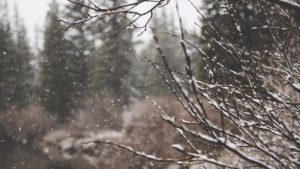
Photo by Arun Kuchibhotla on Unsplash
I map out a week, a day, a list of directions with mileage and time apportioned to each part of the journey. I ascend the stairs to my expectant workspace, turn on a lamp, plug in a single string of red Christmas lights, light a candle and lift the laptop lid. Outside my windows, tiny snowflakes fill the air. The old-timers here say, “Little snow, big snow,” meaning small flakes indicate significant accumulation. I don’t know if this is always true, but I notice the size of the flakes. As I check the weather forecast, my e-mail and the headlines, my gaze is drawn repeatedly to the window. The hypnotic falling snow is the same color as the sky. Disordered ranks of brown cattail stalks stand ankle-deep in the sleeping pond. An infinity of branch, needle and twig is adorned with an even greater infinity of frozen white crystals, falling soundlessly and blurring the colors of stone and wood.
No snowflake ever falls in the wrong place — Zen saying.
It is then that my wheels start to spin. I have set aside this morning to write. I stare at the laptop screen, fingers on the keyboard. Nothing happens. Seeking inspiration, demanding creativity, I make notes, review notes already made, catch up on reading from favorite blogs and my current stack of books. I search for some solid traction so I can move through the day according to my tidy, efficient plan, but I find myself returning to the window, spellbound, empty of creativity or inspiration but full of wonder at the subtle beauty of the winter snow.
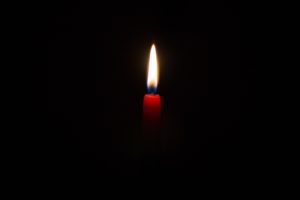
Photo by David Monje on Unsplash
It’s the contrast that catches my attention. My aerie is filled with books, beloved objects, the tools of my life. The warm sticky scent of a red candle fills my space. The red desk lamp I bought at Goodwill more than 10 years ago lights my worktop. My comfortable chair and footstool beckon me to sit and read. The room is warmed by the chimney rising up through it from the woodstove below. I hear my partner talking to our old cat in his office below me; not the words, but the loving sound of his voice that is reserved just for her. He is at his work and I am at mine, cocooned in our private spaces in our slouching farmhouse with lights and heat and the rinsed breakfast dishes stacked on the counter waiting for hot water and soap. We have things to do today, errands to run, people to talk to. We have plans and intentions.

Photo by Galina N on Unsplash
But outside, just beyond the single pane of glass in the old attic windows, is a monochrome world, delicate and cold, still and peaceful. The snow falls without effort. Each flake finds a resting place on the bodies of the trees or the water or the earth. The wood and stone have no place to go and nothing to do. They dwell in the vast power of simply being. The snow settles lightly.
I think about living minimally, weeding out my clothes, the week ahead, money, the perfect Christmas gift I can never find for a loved one, and whether or not we’ll make it into town to do the errands today. I think about drafting a query letter to send out with my first manuscript, which I just finished editing for the fifth or sixth time. I think about reviewing the water rescue information I’ll need next weekend when I travel with a couple of colleagues from work to get deep-water lifeguard certified. It will be a busy week. My careful plan blocks out this morning for coming up with this week’s blog post. I will write … I will begin now … My idea is … Ready, set, go!
My wheels spin, and I look out the window at my little black car, which is wearing a white blanket, and recognize the sinking feeling of no traction. No amount of urgency or frustration makes snow, slush and mud into solid ground. No amount of bullying makes my creativity compliant. I get up. I sit down. I glance at my journal, reread a paragraph in a book, look at some poetry. I feel restless and resentful of my own recalcitrance.
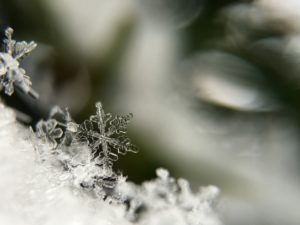
Photo by Aaron Burden on Unsplash
Outside, the snow falls, serene and inexorable as the fading light here in the last handful of days before winter solstice. I open the window and lean close against the hushed, frigid world outside it. My little candle, my lists, my inconsequential blog and my plan for this morning make no impression outside the window screen. It’s time for sleep and dreaming, time for rest. The forest knows, the earth and water know. They lie peacefully under the low sun and the long nights.
My wheels spin, making a noisy mess, throwing clods of half-formed ideas, provocative questions, lingering music of beautiful words, comments and conversations and observations, going nowhere. No traction. The morning is passing. I have not accomplished what I wanted to. I’ve neither rested with the winter snow nor produced a post. I’m torn between self-disgust, resignation and amusement. I think about heavy, cold chains; red, numb hands; wet jeans and sodden gloves; the steady clicking of hazard lights; the feeling of being late and time running out; the texture of wood ash, cat litter, sand and salt thrown onto snow and ice; and the futile laboring of spinning wheels.
The morning is gone. In half an hour we’ll try to go into town. My partner is out with the snow shovel. I shut the window, sit down and open the laptop. I type “Spinning My Wheels” and begin to write this post.
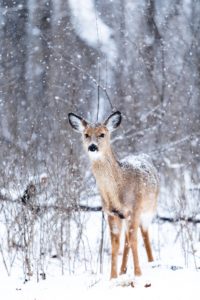
Photo by Teddy Kelley on Unsplash
All content on this site ©2018
Jennifer Rose
except where otherwise noted
by Jenny Rose | Aug 30, 2018 | A Flourishing Woman, Creativity
It’s been a busy week. I haven’t done a lot of writing. Some weeks are about notes, research, sudden creative inspirations, edits and days with a foot in two worlds, the world of the auto shop I’m sitting in this minute with a rattling air conditioner in the window to combat the 100 degree heat index outside while mechanics do surgery on the inside of my old Hyundai to fix the air conditioning, and the world of my imagination.
Other weeks are just about life — activity, interaction with others, appointments, friends and unexpected opportunities, along with the small stories of household and routine, like the AC in the car suddenly ceasing to breathe chill and becoming as thickly humid and overheated as the land’s late August exhalations here in Maine.

Photo by NeONBRAND on Unsplash
A long time ago, when I was a teenager, I got my first job as a summer lifeguard at the local outdoor pool. I loved it. I got trained as a water safety instructor, which means a swim teacher. I was also an IV-certified EMT doing volunteer fire and rescue work.
I’ve never lost my love of water and swimming, and I visit the pool once a week here in Maine. As a regular, I’m familiar with the staff and the facility. A couple of weeks ago one of the pool staff mentioned a part-time position was opening up. Before I left that day I applied for the job and was set up to re-certify as a lifeguard, more than 30 years after the first time. Thirty years. How did that happen?
Now, of course, the process for getting certified is all online. There’s a book, a big, brightly illustrated textbook filled with pictures and graphics, but all the material in the book is also online. The first time around, I learned out of a small paperback manual with black-and-white line-drawn illustrations. The online course is about seven hours of audio, video, multiple-choice questions and written material. At the end, there’s a test. A few hours at the pool in order to practice skills (the most important part) completes the re-certification process.
I’m a good student and confident of my skills, but I unconsciously expected much the same learning experience I had the first time around. However, lifeguarding techniques have changed. The emphasis used to be on personal safety, as drowning people often panic and become dangerous to their rescuers. I spent a lot of practice time in the diving well with a huge college kid built like a tank while he pretended to drown and then tried to drown me as I tried to save him.
Now, there’s great new equipment and gear that make water rescue considerably safer, and the techniques have changed accordingly. Also changed is the way one approaches CPR. When I learned and performed ventilations as a first responder, it was, literally, mouth-to-mouth. Now, lifeguards are equipped with fanny packs in which they carry plastic ventilation masks and Nitrile gloves as protection from body fluids and possible pathogens. Everything, practice included, is done with the mask as a barrier between victim and rescuer.

Photo by Chris Kristiansen on Unsplash
It’s a strange feeling to revisit this information. Lots of memories. I don’t know if I’ll get the job, but even if I don’t I’m pleased about the chance to review. I think everyone should take basic first aid and CPR, and it’s been a long time since I had a refresher. The first time around, I was the youngest lifeguard on the team. This time, if hired, I’ll be one of the oldest. What an interesting circle.
My partner and I love cats. For several years I’ve been uncomfortable with the problem of cat litter disposal. I’ve tried some of the more organic litter, but never found anything both the cat and I liked. The clumping litter is convenient, but I collected it in plastic grocery bags and never found a way to compost it. We’re trying to reduce our use of plastic and our non-compostable waste, and dealing with cat litter has become more and more of a problem ethically. My partner recently came across the idea of using wood stove pellets as cat litter, so we tried it.
I’ve never had a pellet wood stove. It turns out the pellets are small and made of compressed wood scrap, a little bit like animal feed to look at. They’re cheap to buy, especially if you buy a pallet at a time. Cat litter costs three times as much. When they get wet, the pellets dissolve into sawdust. Cleaning the box is like cleaning an animal stall bedded in shavings. I scoop out the damp sawdust and solid waste and throw in a new scoop of pellets. There’s absolutely no smell and less mess outside the box. If our old cat does get pellets between her toes and tracks them outside the box, they’re easy to pick up.
Best of all, we can compost now, and I can stop throwing away any kind of plastic shopping bags. We can switch entirely to canvas bags. Less to haul off to the dump.
My partner has a fleecy polyester blanket in deep, rich colors of brown, black and green that has been a bed for multiple cats for years. We recently cleaned out the little niche it was lying in. I went over both sides with a stiff dry scrubbing brush trying to remove grey and black hair belonging to long-dead cats and then we washed it, but it was still coated with cat hair. I had a lint brush, but that didn’t work at all. I also tried a damp sponge, which is what I’ve always used on upholstery and cloth to remove cat hair. A damp sponge works well if you do it once a week, but this blanket had no attention for years.
So, I googled it. As you can imagine, this is a common problem.
My favorite solution was to obtain a paint roller, wrap the roller in duct tape, sticky side out, and store it, along with a roll of tape, in a closet, bathroom or with cleaning supplies. What a great idea! Fast, easy and cheap. However, I wasn’t sure we had a clean paint roller, so in the end I found a clean plastic dish glove, hung the blanket over the back porch railing, and rubbed it with my gloved hand. I didn’t have much hope, but it worked like a charm. Who knew? Cat hair came away in clumps and clots and floated down onto the grass, as well as adhering to my sweaty face. Too bad it’s not nesting season. I wore out my arm and the blanket looked a lot better, but there was still plenty of hair adhered to it. When I’d rubbed away all I could, I put it in the dryer with a fabric softener sheet on the air setting. A half hour later the dryer trap was filled with cat hair and the blanket was like new.

Photo by Viktor Jakovlev on Unsplash
I also spent part of a day kayaking with a friend on a lake. Too bad I’m not as graceful with paddling as I am swimming. Too bad my arms are about as strong as spaghetti noodles. Too bad I’m so inept the paddles clunk against the side of the kayak with every stroke. Too bad I can’t get the hang of using the paddles without having water run down them and into my lap, or inadvertently bumping my long-suffering friend in the head.
I had a fantastic time.
Then we spent a hot afternoon with an old friend of my partner’s shooting at round metal targets with various firearms and varying degrees of accuracy while I asked a thousand and one questions and continued my education on handling guns safely and developing confidence and skill in using them.
So that, friends, is what I have been doing instead of working on the sort of post I usually write. In the pause from writing, I’ve been refilling the well of creativity with everything, and with nothing. With what it’s like to be alive in the world. With sore shoulders from paddling, remembering old rescue skills and long days on a lifeguard stand in the sun, the challenges and joys of living with cats and the smell of cordite. With spending a morning working in my friend’s farm store chatting to locals, enjoying the animals and studying my lifeguarding manual. With heaving boxes around and shelving books during my volunteer hours in the used bookstore. All of this will somehow, some way, someday recycle into my writing, because everything does.
My car is ready. I’m off to pick up my partner’s laptop at the computer shop in air-conditioned comfort. Then I’ll go home and give this draft another look; decide either to delete the whole thing and start over or get it ready to publish in the morning. I wish you all a good week and a safe Labor Day.
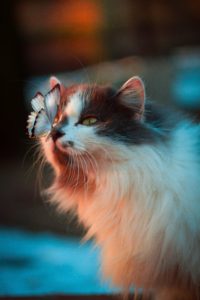
Photo by Karina Vorozheeva on Unsplash
All content on this site ©2018
Jennifer Rose
except where otherwise noted
by Jenny Rose | Mar 1, 2018 | A Flourishing Woman, Creativity
Alchemy: A seemingly magical process of transformation, creation, or combination (online Oxford Dictionaries).

The Star
Emotional intelligence training opened my eyes to the power of needs in our human experience. Coming to terms with my own needs catapulted me into a new life. During the months in which I learned to navigate through my feelings, needs (click here for needs inventories), limiting beliefs and stories, I kept coming back around to the same question.
If I accept that all human beings have needs, and a right to have them met, what then do I do with my unmet needs, past and present?
We might all have a right to get our needs met, but that doesn’t mean we have a guarantee they will be met, or that we can hold anyone responsible for meeting them. We can meet some of our own needs, but not every one. Some needs require healthy connections with others, but not everyone has that. Some people don’t have a single healthy connection with another human being, let alone many, and one relationship can’t meet all our needs.
Unmet needs are devastating, make no mistake. They drive addiction, all kinds of violence and power-over behavior (like school shootings), mental and physical disease and illness, and suicide. A chronically unmet need is a nonhealing, stinking ulcer on the soul. We may hide it from others and even ourselves, but it never stops oozing blood and pus. Unmet needs can cripple and/or kill us. We can let go of some people, behavior and beliefs, but needs are intrinsic.
None of us can entirely meet another’s needs. We all have limitations of some kind, and finite resources of time and energy. Being unable to meet another’s needs is not necessarily because we’re unloving or uncaring. Most of our close relationships probably do meet some of our needs some of the time, and we meet some of their needs some of the time. It’s not black or white. It’s a continuum, a balance of reciprocity.
So, I ask again, what about our needs that just don’t get met because even our healthy connections are unable to fill them?
At that point we make choices. We can choose to:
- Act out in some desperate, destructive or deadly way that hurts ourselves or others.
- Blame the people around us for failing to meet our needs.
- Blame ourselves for having needs and feeling the pain of having them unmet.
- Deny that we need anything from anyone — ever (my personal favorite).
- Figure out how to neutralize the experience of unmet needs.
By neutralize, I mean accept and surrender to how painful it is to carry around a bone-deep, persistent longing for something that’s unavailable.
Acting out has never been my style. I’m also not much interested in blaming others for what goes wrong in my life. It feels like a cop-out and it disempowers me. Blaming myself — now that I’m very good at. I’ve spent years perfecting the art of self-loathing, but it’s never been helpful. Not even one time. Besides that, it hurts. I can’t pull off denial, at least not for long. I might refuse to admit certain things to someone else, but I don’t play games like that in the privacy of my own head. I have a file in my documents labeled ‘Denial File.’ Now and then I put something in that file and leave it there while I wrestle with my unwillingness to believe. When I’m ready to stop arguing with what is, I take it out and re-file it. Usually, the Denial File is empty, but I like knowing it’s there for the really tough information.
That brings me to the last choice, which leaves me standing squarely in my power. I don’t hurt myself, I don’t hurt anyone else and I get to think outside of the box — my favorite thing! What kind of alchemy transforms, creates or combines an unmet need into something beautiful?
For several months I’ve been researching outer space for my second book. I’ve compiled lists of constellations and the mythology around them. I have definitions of meteors, comets and nebulae. I’ve spent hours looking at images from space. Astounding, mysterious, vast and lovely, the universe is infinitely larger than the largest playing field I can imagine. I gulp down science fiction books and I’ve watched hours and days and weeks of Star Trek, Stargate, Battlestar Galactica, Firefly and yes, yes, Star Wars!
I also, fairly frequently, turn up The Star card when I work with my Tarot deck. The Star symbolizes creative powers, confidence and diversity.
So, what if I create a cosmos? Great word, cosmos. It means “the universe seen as a well-ordered whole” (online Oxford Dictionaries). I’m always in favor of well-ordered, especially when I get to define it. All the pieces of my experience, including unmet needs, are part of a whole. I prefer combination and integration to amputation.

Photo by NASA on Unsplash
Here I am, with my unmet needs, my history, the people who have been significant in my life and a lot of passionate feelings to express and process. I’m an alchemist, a creator, and before me is a vast black nothingness.
I want stars in my cosmos, so every tear I’ve ever cried becomes a star. I fling them far and wide, like handfuls of tiny crystals. My cosmos is so vast there’s always room for more.
I want planets in my cosmos. I hang them carefully, one by one. These are the people in my life, past and present, living and dead. Some are hot planets, sere and lifeless. Others are cool and green and blue. Every cosmos needs a bloviating, bullying gas giant with heavy gravity that sucks more than its fair share of, well, everything! Rings are decorative, and spots and alien seas and strangely-shaped continents. Also, sand dunes and storms, poisonous (to us) gases, radiation, erupting volcanoes, mountain ranges and glaciers.

Photo by NASA on Unsplash
How about moons? Cool and sterile or lush and verdant; I definitely want moons. I want constellations, too, and stories to go with them. Blazing meteors and trailing comets add movement. Nebulae add color and mystery. Galaxies swirl and spiral or spill like ribbons of milk against the darkness. Black holes suck. Suns supernova.
One by one, I use my unmet needs to decorate my cosmos. I turn them into color, texture, pattern, alien world, moon, star, sun, comet, meteor and nebula. I name them, animate them with feeling, polish them like jewels and set them in place. Maybe they stay in the farthest reaches of my cosmos, where I rarely visit them, or maybe I keep them closer. Perhaps my unmet needs appear from time to time in a meteor shower or a comet with a long tail, and I marvel at their beauty and mystery and remember again their taste and feel before they burn away to ash or disappear behind a planet.

Photo by Bryan Goff on Unsplash
My cosmos is my laboratory and my kitchen, illuminated by starlight. I stir and simmer over the heat of suns; chop and mix under waxing and waning moons; grind alien insects, rocks and roots for pigment and infuse gas and cosmic dust with color. I orbit, I dance from galaxy to galaxy in bare feet, combine a pinch of this with a handful of that until I float, weightless and free, in a cosmos of my own design and decoration.
Whenever the world is too much with me and I find myself staggering under burdens of unmet needs and other things I cannot release, I unlock a hidden door with the key I carry between my breasts and find star candles lit, suns asimmer, planets revolving and black holes lurking. Mortar and pestle, cauldron and crucible wait for my magical offerings as I combine, create and transform the material of my life into a complex and resplendent whole.
Alchemy. My daily crime.
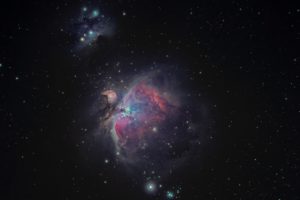
Photo by Bryan Goff on Unsplash
All content on this site ©2018
Jennifer Rose
except where otherwise noted
by Jenny Rose | Apr 6, 2017 | A Flourishing Woman, Creativity
Walking on our 26 acres, my path winds around open fields and keeps me out of heavy woods and brush, where ticks are waking. It’s grey and overcast, not raw but damp, a combination of snow and rain coming down and turning my already wild hair into a mad woman’s wig. The surface of the snow is glazed hard in most places, but when I get close to the tree line or streams that trickle down to the river, I punch through it and sink. Walking on the thick layer of leaves under and among the trees is like walking on a sopping sponge. My socks are sodden inside my winter boots.
I see thickets where the deer have slept, melting the snow with their warm bodies, lying out of the wind in the shelter of trunk and branch. I imagine them rising to their feet, squatting in their awkward way to leave pellets and a splash of urine, and then stepping away through the snow with those delicate hooves and legs. Their spoor is everywhere.

Photo by Teddy Kelley on Unsplash
The medical transcription business is wildly unpredictable. One seesaws between frantic pleas from supervisors for overtime because of a sudden flood of work and the dreaded “no jobs available” message upon logging in. As I’m paid by production, no work means no money. Since the new year, work has been slow in the company and transcriptionists and supervisors alike are feeling the stress.
I’ve been thinking about my fear of not enough these days, and how small it makes me and my experience of life. One of the reasons I like to go out and walk is because it pushes against my tendency to curl up in corners and play hours of solitaire while I make up stories about living under bridges and berate myself for NOT PULLING MY WEIGHT and WASTING TIME.
The river is still ice covered, the edges yellowish and slushy. I see animal prints in the snow over the ice, but I wouldn’t dare try to walk on it. As I lean against a tree and look down at the ice-bound river, I hear a nesting pair of barred owls calling to each other, though it’s still early afternoon.

Photo by Vincent Foret on Unsplash
The truth is my medical transcription job is nothing more than a means to an end. It’s all about the paycheck. I take some modest pride in my ability to do an accurate, fast job, but I’m just a pair of skilled hands and ears. One day, when the job and I are finished with one another, I’ll leave no remnants of myself, no track, no scent, no spoor. It irritates me that it has so much power in my life when it means so little.
Water drops tremble on bare twigs and tree branches. The pussy willows are beginning to bud. Cloudy light washes the willow buds and water drops the same silvery grey and I have to draw near to tell the difference.
We’ve lately found a local lawyer to help us update our wills and take care of end-of-life paperwork. It’s made me think about all the fragments I’ll leave behind me, the furniture I’ve loved and polished; the mirror I’ve looked in since I was a child; the books I’ve handled and read in cars, in bathtubs, at tables, in beds and chairs and waiting rooms. All these things will be sifted through, separated, sold, passed on. What money there is will be divided and wind up in other bank accounts or hidey holes or cast back into the flow somehow. Perhaps whispers of me will cling to a few objects, but for the most part no one will ever know I passed this way.
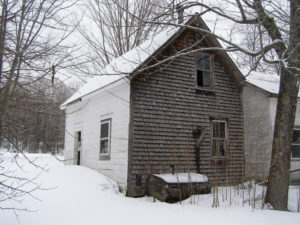
OLYMPUS DIGITAL CAMERA
We have an old shed on the land and snow slide off the roof has blocked the door and partially pushed it open. I’m just able to squeeze in over a thick layer of ice on the threshold, formed by melting snow dripping off the roof.
We cleaned out and swept the shed last fall, but I find pages of paper blown all over the floor, pages of the first draft of my book manuscript. Last summer we had visitors who used the shed, and I’d hoped they would read and give me some feedback. They didn’t, and I’d never found the manuscript when I looked for it after they left, but the winter currents and drafts discovered its hiding place. Perhaps the wind read it as it ruffled through the pages with chill fingers.
It’s odd to see those scattered pages on the cold, splintered floor. The sight of them gives me a desolate clarity. Those written words are the most important thing I have. Working or not working, large paycheck or vanishingly small paycheck, all the objects I love and use and call mine — none of that is really who I am. None of it really matters, though it takes up space in my life. None of it contains the smell of my breath, the taste of my pain or the spoor of my love the way my words do. It’s as though it’s me lying there, discarded, damp and wind strewn, unseen, unread, unwanted. It hurts me.
As I gather up pages, I note where the snow has drifted through gaps in corners. Wrinkled beech leaves lie on a discarded futon, whirled in through the broken window above it. I open a ramshackle cupboard and find a roll of shredded toilet paper and evidence of mice at work, making the most of an unexpected bonanza of nesting material.
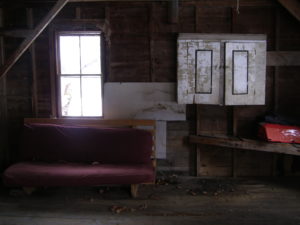
I find a bottle cap and cigarette butts on a window sill. More leavings. I know who stood there, smoking, looking out the window. I stood where he’d stood and picked up the butts, knowing his lips were around them, his long-fingered hand had carried them from pack to mouth and then stubbed them out in the bottle cap, a tiny ashtray. I wish for the nose of a wild creature so I could search for the cold, lonely ghost of his scent.
He was here. I am here. Deer crisscross this land we call ours. Mice go about the business of ensuring more mice, and the barred owls carry on their early spring conversation about mating, nesting, eggs and all those mice. We are so caught up in jobs and money and things. We give them so much meaning. The days go by and we alternately struggle and dance through them. But one day we’ll be gone, and we’ll all leave spoor behind, a scent or sign or footprint uniquely and simply ours.
These words are my footprints, my scent, my lingering warmth in the places I came to rest, my spoor. They are signs of my passage and the truest things I have to leave behind when I’m gone.
All content on this site ©2017
Jennifer Rose
except where otherwise noted
















